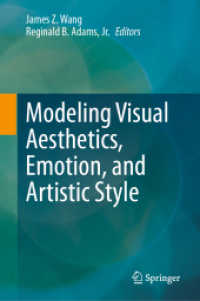- ホーム
- > 洋書
- > 英文書
- > Psychology
Full Description
Intellectual styles are individuals' preferred ways of using their abilities. This book provides the first comprehensive and systematic review of existing research on the value and desirability of different intellectual styles. By critically analyzing findings from hundreds of international studies undertaken over eight decades, Li-fang Zhang demonstrates that the creativity-generating Type I styles are generally superior to the norm-conforming Type II styles in relation to a wide range of learning processes and developmental outcomes, work performance, physical and mental health, and many other domains of people's lives. She further demonstrates that people explicitly and implicitly express their preference for Type I styles over Type II styles. Professor Zhang elucidates the practical value of cultivating diverse intellectual styles, especially Type I styles, in both academic and nonacademic settings, and lays the groundwork for future research to advance the field of intellectual styles and to inform scholarly work in other academic disciplines.
Contents
Part I. General Introduction: 1. Motivation for this book; Part II. Empirical Evidence: Two Classic Variables and Intellectual Styles: 2. Distinguishing intellectual styles from intelligence and personality; 3. Creativity and intellectual styles; Part III. Empirical Evidence: Academic Settings: 4. Intellectual styles in student learning processes and developmental outcomes; 5. Intellectual styles of school teachers and university academics; Part IV. Empirical Evidence: Non-Academic Settings and Style Preferences: 6. Intellectual styles in the workplace; 7. Intellectual styles among the mentally and physically disadvantaged; 8. Explicit and implicit intellectual style preferences; Part V. Concluding Remarks: 9. Conclusions, limitations, future directions, scientific significance, and practical implications; Epilogue.







